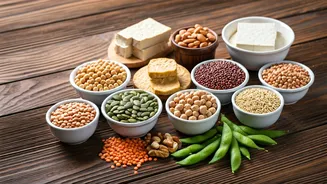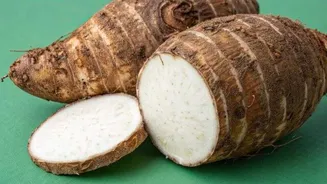Protein's Crucial Role
Protein, a fundamental macronutrient, is essential for numerous bodily functions. It's the building block for tissues, muscles, and enzymes, playing a key
role in repair, growth, and metabolic processes. For fitness enthusiasts, protein is vital for muscle development and recovery after workouts. It helps in the synthesis of new muscle fibers and assists in repairing the damage from intense exercise. It also promotes satiety, reducing cravings and contributing to weight management. Without adequate protein, the body struggles to maintain muscle mass, repair cells effectively, or efficiently metabolize nutrients, making protein an irreplaceable component of any balanced diet. For vegetarians, understanding how to obtain enough protein from plant-based sources is crucial for supporting their health and fitness goals.
Legumes: Protein Powerhouses
Legumes such as lentils, chickpeas, and various beans are excellent sources of protein. Lentils, often a staple in Indian cuisine, offer a high protein content along with essential fiber and iron, contributing to digestive health and energy levels. Chickpeas, also known as garbanzo beans, can be incorporated into salads, hummus, or snacks, and are rich in protein and complex carbohydrates. Beans, available in numerous varieties like kidney beans, black beans, and pinto beans, are versatile in meals and provide a substantial amount of protein, fiber, and various micronutrients. Consuming a diverse range of legumes is beneficial; it ensures a wide array of nutrients and amino acids, vital for maintaining overall health. Regularly including legumes in your diet supports muscle development and overall well-being.
Tofu, Tempeh, and Edamame
These soy-based products offer complete protein profiles, which contain all nine essential amino acids the body cannot produce. Tofu, versatile in its texture, can be used in stir-fries, smoothies, or even scrambled like eggs. Tempeh, made from fermented soybeans, has a firmer texture and a nutty flavor that makes it a great addition to various dishes. Edamame, young soybeans, are often served as a snack or side dish and provide a substantial amount of protein and fiber. These soy-based foods not only contribute to protein intake but also provide iron, calcium, and other essential minerals. Their versatility allows them to easily fit into different meal plans, supporting both muscle growth and overall health. Careful consideration of soy intake is advisable if you have allergies or other dietary restrictions; consult with a healthcare professional as needed.
Nuts and Seeds for Protein
Nuts and seeds serve as portable, protein-rich snacks and ingredients for meals. Almonds, cashews, and walnuts provide protein along with healthy fats, fiber, and various vitamins and minerals. Seeds like chia seeds, flax seeds, and hemp seeds are also valuable sources of protein, along with omega-3 fatty acids and other nutrients. Including a variety of nuts and seeds in the diet can help in creating diverse nutrient intake while providing an enjoyable taste experience. They can be added to salads, cereals, or used in smoothies, giving an extra protein boost. Moderation is key because nuts and seeds are calorie-dense; it is necessary to consider portion sizes to maintain a balanced diet. Including them as part of your daily intake can greatly assist in achieving your daily protein requirements and improving your overall well-being.
Protein-Rich Grains
While not as protein-dense as legumes or soy products, several grains contain a significant amount of protein and contribute to daily intake. Quinoa, a complete protein source, contains all nine essential amino acids. It can be used as a base for salads or in place of rice. Oats are another excellent option, often used for breakfast; they also provide fiber and complex carbohydrates. Spelt and amaranth, though less common, are other grains with decent protein content and added health benefits. Including these grains in meals provides a varied approach to protein consumption and introduces a range of vitamins, minerals, and fiber to the diet. Combining them with other protein sources improves the overall protein profile and provides a good balance of nutrients.
Incorporating Into Meals
Planning meals to incorporate the best vegetarian protein sources is critical to ensure proper intake. For breakfast, consider tofu scramble with vegetables or a smoothie with added protein powder and seeds. Lunches might include a lentil salad, a chickpea and vegetable wrap, or a quinoa bowl with beans. Dinners can feature tempeh stir-fries, bean-based chili, or a pasta dish made with added nuts or seeds. Snacks could involve a handful of nuts, edamame, or a small portion of a protein shake. It is key to vary the protein sources across different meals to receive a wide array of nutrients and amino acids. Combining these sources with vegetables, fruits, and whole grains enhances overall nutrition and provides a balanced diet that supports muscle development, energy levels, and overall health. This strategy ensures continuous, even distribution of proteins, promoting better absorption and use by the body.
Protein Supplements Usage
For vegetarians, protein supplements such as pea protein, soy protein, or brown rice protein are suitable to meet their protein requirements, particularly for those with high protein needs or active lifestyles. They offer a convenient way to boost daily intake, especially after workouts. Whey protein is not suitable for vegetarians, so plant-based options are preferred. It is important to look at the ingredients and nutritional content to ensure that they are free of additives or allergens. Supplements should be used in conjunction with whole food sources, not as a replacement. The dosage should align with individual needs, considering activity levels, and overall dietary protein intake. Consulting a registered dietitian or a nutritionist can provide personalized guidance, helping in the selection of the most suitable supplement and making sure it fits into a comprehensive nutritional plan.
Hydration and Considerations
Drinking adequate water is essential for optimal health and efficient protein utilization. Water helps the body to process and use nutrients effectively and supports various bodily functions, including muscle repair and recovery. Vegetarians should also pay attention to iron, vitamin B12, and omega-3 fatty acids, nutrients that can sometimes be harder to obtain through a plant-based diet. Include iron-rich foods, such as lentils and spinach, and consider supplementing with iron if needed. Vitamin B12, crucial for nerve function and red blood cell formation, may require supplementation or consumption of fortified foods. Omega-3 fatty acids, important for brain and heart health, can be sourced from flax seeds, chia seeds, and walnuts. Regular blood tests and consultation with a healthcare professional can assist in monitoring nutrient levels and adapting dietary strategies to meet all nutritional needs effectively.














